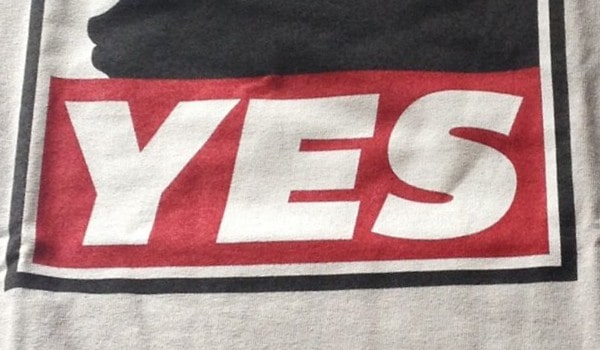
I still have a hard time saying “no” to things.
I’m getting better at it all the time, but that doesn’t mean I find it easy. Why? Because I’m naturally a “yes” person – and I’ve gotten used to saying yes over the years. In fact, I’d argue that all of the times I said yes has allowed me to start saying “no” more often.
As a trained improviser, I was taught to say yes to every offer. My friend Dave Morris has discussed the power of saying yes in his excellent TEDx talk The Way of Improvisation, and I’ve seen how well things play out when everyone is accepting of the offers being laid out to them in an improvised scene. It’s magical for the audience to see and for the performers to deliver, but it’s even better when another word is added to the end of the yes. That word is “and.”
By tagging on that very powerful word, you start building something more out of that yes. It allows for innovation to happen, which is even more magical. It gives your fellow players more to work with, and moves the scene forward.
That’s what a yes can do for you…and what it’s done for me.
I’ve gotten better at adding that “and” to the end of my yes answers. I’ll offer to attend an event and then figure out what else I can do that scales beyond the basic scope of the commitment to make it more valuable for me. That allows me to move myself and my work forward. Frankly, the “and” has done its part in helping me move towards a no answer in a lot of ways. If I can’t find anything of additional value outside of the scope of the commitment , then I’ll be better equipped to turn the opportunity down.
When I first started out building up Productivityist, I took on a lot of projects and obligations for several reasons. These were my “and” value-adds. The big three value-adds that often drew me to saying yes to commitments were as follows:
1. Skill Development
There’s no way I’d have been able to develop my skills as a writer, speaker, and teacher if I didn’t accept the offers to take part in events and teach workshops for far less than I make now for those sort of things. I built up my confidence, built up my proficiency, figured out what I needed (and what I didn’t need) to have at my disposal, and learned what worked and what didn’t. I’m still learning, and I’m still doing events and workshops for less than my going rate (although those are fewer and farther between now). I’ll examine opportunities and see if I can develop a skill I want through them. If so, I’m more likely to say yes. If not, then I have no problem saying no.
2. Improved Judgement
I would have no idea what to agree to and what to turn down if I had no frame of reference. Saying yes has given me that frame of reference. I have been able to figure what works for me and what doesn’t for the most part because I’ve agreed to a wide variety of commitments over the years. I’ve learned what my boundaries are and where to place them. I’ve become far better at identifying the value-adds in an opportunity and when the opportunity just doesn’t align with my values or line of thinking. By accepting a ton of opportunities over time, I have honed my ability to better evaluate opportunities that come my way and judge them accordingly.
3. Building Authority
If I had stayed home instead of putting myself out there, I wouldn’t have as much authority in my field. Since I’ve made appearances at events like South By Southwest, New Media Expo, TEDx, creativeLIVE, and more, I’ve built up my authority. If I had said no to more opportunities than I said yes to when I was beginning my journey with Productivityist, then the company and my own reputation would not have spread nearly as far as it has. I’ve started down the right path by building authority organically through event attendance, putting my writing work out there beyond the walls of this website, along with other efforts that I know are valuable. All of that has come through saying yes a whole lot before uttering my first “no.”
Saying no is definitely worthwhile as it allows you to focus on what matters most as opposed to splitting your focus among multiple commitments. But don’t discount the “yes” because it’s what will help you figure out the “no” stuff now…and in the future.

